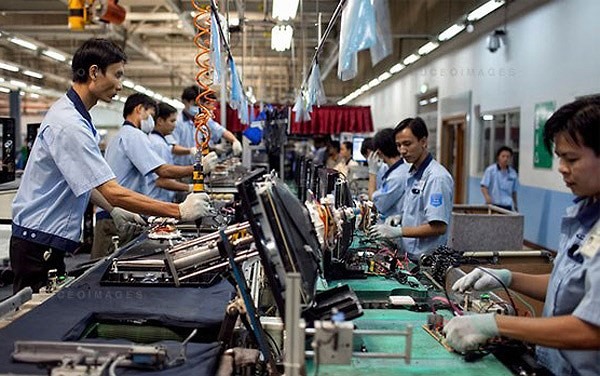 Economy
Economy

The manufacturing sector in Việt Nam continued to expand in June, and at an accelerated rate, the latest survey from Nikkei revealed on Monday, with a manufacturing PMI score of 55.7 from 53.9 in May.
 |
| Việt Nam’s manufacturing output increased at a substantial pace in June. - Photo vov.vn |
HÀ NỘI – The manufacturing sector in Việt Nam continued to expand in June, and at an accelerated rate, the latest survey from Nikkei revealed on Monday, with a manufacturing PMI score of 55.7 from 53.9 in May.
According to the survey, the reading signalled a marked monthly improvement in the health of the sector, and one that was second only to the series record seen in March 2011. Business conditions have now strengthened in each of the past 31 months while manufacturing output increased at a substantial pace as the rate of growth accelerated for the third month running.
“The Vietnamese manufacturing sector appears to be motoring midway through 2018, with growth of output and new orders among the fastest seen since the survey began in 2011,” Andrew Harker, Associate Director at IHS Markit, which compiles the survey, said.
Panellists reported that higher new orders and stronger client demand had been behind the rise in output. In line with the picture for production, the rate of growth in new orders was among the steepest seen across the survey’s history so far. New orders have risen continuously since December 2015.
The rate of expansion in total new business outpaced that of new export orders in June, with new business from abroad increasing at a slower pace than in May. That said, the rate of growth remained high.
According to the survey, higher workloads led firms in Việt Nam to take on extra staff in June. Moreover, the rate of job creation quickened to a new survey record. Record hiring helped firms reduce their backlogs of work fractionally, despite strong new order growth.
“The current growth phase has been extremely positive for Vietnamese workers, with firms taking on extra staff at a record pace during June,” Harker said.
Manufacturers also upped their purchasing of inputs sharply in June, with the rate of expansion the third-fastest in the series so far. This helped firms increase their stocks of purchases. On the other hand, stocks of finished goods decreased as inventories were used to satisfy new orders.
Input costs rose sharply, with the rate of inflation quickening for the third month running to the steepest since February. Higher oil prices and shortages of raw materials contributed to increased cost burdens. Supply shortages were also mentioned by those firms that saw delivery times lengthen. Lead times increased for the seventeenth successive month.
Manufacturers responded to higher input costs by raising their output prices, extending the current sequence of inflation to ten months. Selling prices also increased at the fastest pace since February.
Although easing to a four-month low in June, confidence among manufacturers remained strong. According to respondents, new order growth is set to support increases in output over the coming year. - VNS




